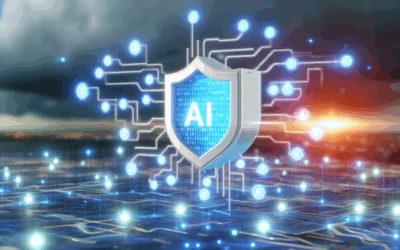Introduction to AI Security
AI security encompasses the measures and protocols designed to protect artificial intelligence systems from various threats and vulnerabilities. As AI technologies are integrated into critical sectors such as finance, healthcare, and transportation, the need for robust security protocols becomes increasingly paramount. Effective AI security not only safeguards information and assets but also builds trust among users and stakeholders. The evolving nature of threats demands continual adaptation in security strategies to address potential breaches and ensure the integrity of AI systems.
Current Trends in AI Security
Current trends in AI security reflect the rapid evolution of technologies and methodologies aimed at safeguarding AI systems from emerging threats. A primary trend is the integration of machine learning techniques in cybersecurity frameworks, which enhances threat detection capabilities by analyzing patterns and anomalies in data. This approach allows systems to proactively respond to potential breaches, as seen in advanced threat detection platforms utilizing AI for real-time analysis [Source: Forbes].
Another significant trend is the increasing collaboration between public and private sectors to formulate standards and best practices for AI security. Initiatives like the National Institute of Standards and Technology (NIST) Cybersecurity Framework are pivotal in establishing guidelines that promote robust security while fostering innovation [Source: NIST].
Additionally, the rise of Explainable AI (XAI) is crucial in AI security, as it provides transparency in decision-making processes. This transparency helps organizations understand AI behavior, thus enabling them to identify potential vulnerabilities and biases in security systems [Source: ScienceDirect].
Moreover, there is a growing focus on ethical AI practices, emphasizing the importance of building AI systems that not only prioritize security but also adhere to ethical standards. This is essential in mitigating risks associated with bias and discrimination in AI applications, further strengthening overall security frameworks [Source: World Economic Forum].
These trends signify a transformative phase in AI security, driven by technological advancements and a collaborative approach to mitigating risks associated with AI systems.
Risks and Challenges
The implementation of AI technologies presents numerous risks and challenges that organizations must navigate to ensure effective security. One significant risk is posed by adversarial attacks, where malicious actors exploit weaknesses in AI systems to manipulate outcomes or extract sensitive data. These attacks can be difficult to predict, requiring organizations to maintain vigilance and continuously update their security protocols.
Another challenge is the issue of data privacy. With AI systems relying heavily on vast amounts of data to learn and improve, maintaining user privacy becomes a critical concern. Organizations must develop strategies that ensure data is handled responsibly and ethically, particularly in industries like healthcare where sensitive personal information is prevalent.
Moreover, the lack of standardized frameworks for assessing AI security creates inconsistencies in security practices. Various organizations may adopt disparate security measures, leading to vulnerabilities as attackers seek out the weakest links. This necessitates a concerted effort to establish comprehensive security guidelines across the industry.
The Future of AI Security
As technologies and threats evolve, the future of AI security will likely be shaped by several key factors. First, the increasing sophistication of AI-driven cyberattacks will necessitate more advanced defensive measures, likely incorporating further advancements in machine learning and other cutting-edge technologies. These defenses will need to focus on predictively responding to threats rather than merely reacting to them.
Furthermore, the ongoing collaboration between government entities and private sectors will be vital in developing universal standards and protocols aimed at enhancing AI security. Such initiatives will not only improve the overall security landscape but also promote ethical AI practices that prioritize user safety and data protection.
Finally, the maturation of Explainable AI will continue to enhance transparency within AI systems, allowing organizations to gain greater insights into the decision-making processes and identify security vulnerabilities more effectively. With ongoing advancements in technology and a focus on ethical implications, the future of AI security promises to be dynamic and transformative.



